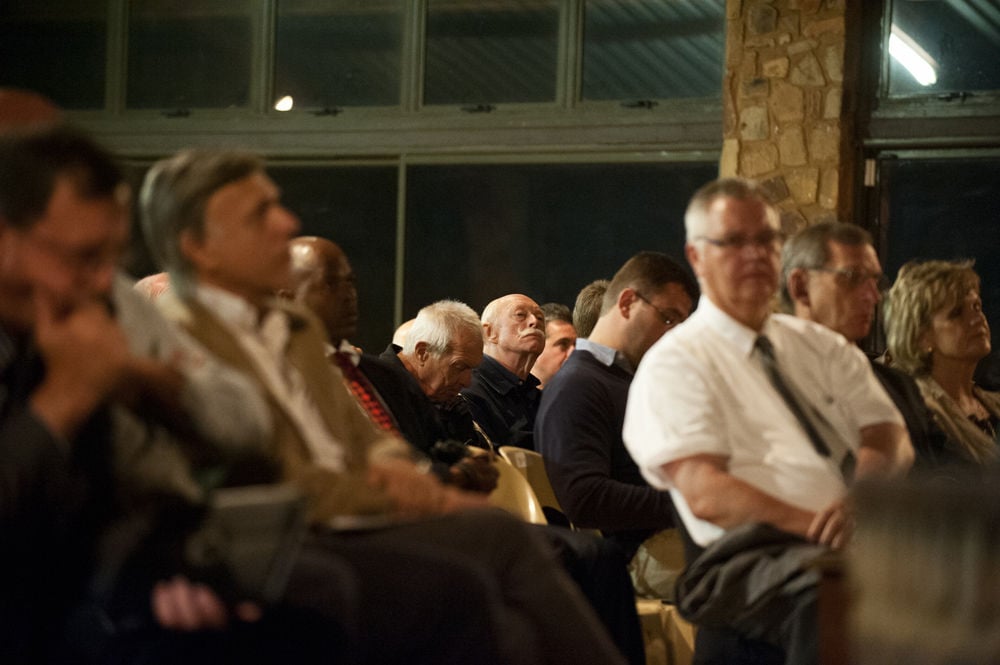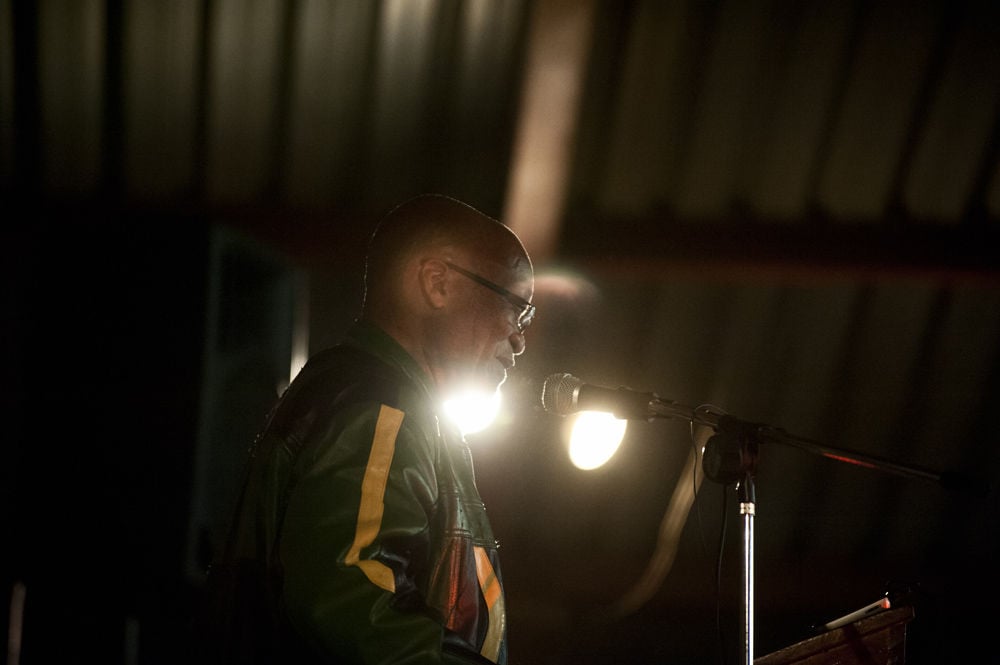President Jacob Zuma addresses the Afrikaans community about the reopening of the land claims process.
If the ox-wagon symbolises the boer nation's plunderous great trek north in search of land and prosperity, the ANC, forged by the struggle against the 1913 Natives Land Act, is the ossewa's symbolic counterpoint.
Yet this appeared lost on President Jacob Zuma, who, at the Voortrekker Monument in Pretoria on Wednesday night, stood wedged between a wagon wheel on the wall behind him and ANC colours on the table before him, exchanging pleasantries with organisations from the Afrikaner community on land reform.
Two weeks before the national election, the ANC's biggest challenger on land appears to be the Economic Freedom Fighters (EFF), which has called the ANC out on its land policies, demanding land redistribution without compensation.
Thus far the ANC has neither seen fit to respond directly to the EFF, at least not publicly, nor to its core audience on the subject: those who were dispossessed of their land first by colonialism and later by the apartheid government and its forced removals.
Instead, it was mainly white commercial farmers who on Wednesday night were provided with insight into how the ANC arrived at its moderate stance on the issue.
Community exclusion
Nongovernmental organisations have criticised the government for excluding landless communities from the parliamentary process of drafting the Restitution of Land Rights Amendment Bill, passed by Parliament in February.
At the meeting with the Afrikaans community, however, the party's leaders spoke openly about the ANC's own wrestling with the issue.
Zuma stood in for ANC deputy president Cyril Ramaphosa and his fellow Codesa negotiator, Roelf Meyer, who were both called away to urgent meetings that afternoon.
Several speakers took issue with land restitution, with some raising the point that the land reform process had not yielded more commercial farmers.
One speaker let slip that in a meeting with the Afrikaans community just before Wednesday evening's event, Zuma had reached out in an apparent attempt to find common ground, confessing that he wanted to farm Nguni cattle when he retired. He did not mention that the cattle back in his controversial Nkandla kraal are Nguni.

Afrikaans farmers and leaders listen to ANC speakers at the Voortrekker Monument.
With those pleasantries duly exchanged, Zuma and his team received very little hostility from the likes of AgriSA, which had previously called the reopening of the land claims process a "crushing blow to commercial farmers".
AgriSA vice-president Theo de Jager softened his tone on Wednesday, but said uncertainty over South Africa's policy had worried investors. He said this had cost the sector much-needed "capital".
Zuma delegated the task of responding to these issues to Minister of Tourism Marthinus van Schalkwyk, who at that moment appeared willing to take the audience into his confidence. He hinted that the ANC had discussed the possibility of radical land reform, and possibly even a referendum on the matter, in what was a "heated debate".
But to put the issue to the vote was something the party simply could not risk.
"What do you think would happen if we had a referendum on land? How do you think the majority would have voted? I think we all know what the answer is," Van Schalkwyk said, to knowing nods from his audience.

Jacob Zuma addressing the community. (Photos: Madelene Cronjé, M&G)
And with that, the ANC considered its other options: to reopen the land claims process indefinitely, to reopen it until 2020 or to reopen it for the next five years.
"We settled on reopening the process for another five years," said the minister.
Zuma said Van Schalkwyk had answered the question "very well", and that the "reality" is that land is an issue that has to be dealt with.
Zuma added that the government recognised that its approach to land redistribution had been flawed, in that new farmers had not been assisted when they had received their land.
"Since 1994, we didn't plan properly… we just handed back land and left it like that.
"We recognise this weakness," said Zuma.
Zuma said it is important to remember that land claimants may also choose financial compensation instead of receiving land.
"If you are like me, and you don't know money, you will choose the money over the land option," he said.
Nkandla, Cyril jokes lighten mood
Coetzee Bester, a former National Party MP and the master of ceremonies on Wednesday night, said he hoped there would be no "unspeakables" between the Afrikaans community and President Jacob Zuma.
But the one "unspeakable" issue was the piece of land comprising the presidential compound at Nkandla, joked Bester. "Just now I was talking to a rich businessman and I asked him why Nkandla should be one of our '‘unspeakable' issues tonight. He said: 'Because my mansion is bigger than Zuma's!'" said Bester, to laughter from the audience.
With that, Nkandla was off the table. However, and without mentioning the issue by name, Zuma said the ANC is "serious about corruption".
"Public officials who are found guilty of corruption by a court of law will have to pay back the money and will be removed from positions of leadership, in the ANC and in government," Zuma said earlier in the evening.
Another "unspeakable" was Cyril Ramaphosa's recent "boers" remark. Addressing a crowd in Limpopo in November 2013, the ANC deputy president said if the ANC was voted out of power, the "boers" would return.
"Looking at the stage tonight, Mr President, I think it's clear that the boers have returned. They are taking over the ANC from the inside!" Bester joked.
To Zuma's right and left sat the former New National Party leader, now tourism minister, Marthinus van Schalkwyk, and former National Party member, now deputy minister of sport and recreation, Gert Oosthuizen.